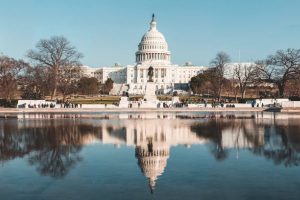With “NUDGE” Act, Congress Targets Social Media (Again)
 A new bipartisan bill – the Nudging Users to Drive Good Experiences on Social Media (“NUDGE”) Act – co-sponsored by Democrat Sen. Amy Klobuchar and Republican Sen. Cynthia Lummis, taps the National Science Foundation (NSF) and the National Academy of Sciences, Engineering, and Medicine (NASF) to develop “content-neutral” methods to control the circulation of misinformation and curb addiction to social media sites. The two bodies will be tasked with conducting studies to determine how content is spread, then establishing a set of “recommendations” for platforms. Sites that do not comply will be held accountable by the FTC.
A new bipartisan bill – the Nudging Users to Drive Good Experiences on Social Media (“NUDGE”) Act – co-sponsored by Democrat Sen. Amy Klobuchar and Republican Sen. Cynthia Lummis, taps the National Science Foundation (NSF) and the National Academy of Sciences, Engineering, and Medicine (NASF) to develop “content-neutral” methods to control the circulation of misinformation and curb addiction to social media sites. The two bodies will be tasked with conducting studies to determine how content is spread, then establishing a set of “recommendations” for platforms. Sites that do not comply will be held accountable by the FTC.
Said Klobuchar: “For too long, tech companies have said ‘Trust us, we’ve got this.’ But we know that social media platforms have repeatedly put profits over people, with algorithms pushing dangerous content that hooks users and spreads misinformation. This bill will help address these practices… It’s past time to pass meaningful reforms that address social media’s harms to our communities head-on.”
The NUDGE Act claims to be different than other regulations and proposals which have hurt the adult industry (or are poised to do so), like SESTA/FOSTA or Earn it Act, because NUDGE focuses on how content is spread, not on what is in the actual content. It seeks to add what is called “friction” to social media platforms so that users will actively be a part of stopping dissemination of harmful content by changing their behavior.
This idea of “friction” has had some success for Twitter, for example, who asked users to be nicer on the platform. According to Protocol, Twitter’s internal research claims it has worked. How the NSF and NASF will establish one size fits all fixes for problems is anyone’s guess, but Public Knowledge, a group who fights for a free internet, supports the bill stating that it “encourages informed decision-making” to stop promotion of misinformation while at the same time not “tying compliance to Section 230 immunity.”
On the surface, the NUDGE Act seems like a good idea. However, even if the NSF and NASF can pinpoint issues for which it could be next to impossible to implement fixes and that could step on First Amendment rights. YNOT spoke with attorney Lawrence Walters of the Walters Law Group which has a practice area involving freedom of speech to get his opinion on the bill:
“The NUDGE Act appears to be a response to the political pressure on Congress to ‘do something’ about the potentially harmful effects of social media without stepping on the third rail of Section 230 immunity,” Walters told YNOT. “In that way, the bill is an improvement compared to other legislation such as the EARN IT Act which would result in dramatic censorship by online platforms because of changes to Section 230 immunity. However, the NUDGE Act is not free from constitutional concerns.”
“Any attempt by the government to mandate how user generated content is displayed on social media sites could violate the First Amendment rights of the platforms to decide how, and whether, to publish the content,” Walters continued. “The required implementation of the reporting obligations are burdensome and the interventions are likely unnecessary. Large online platforms already offer some of the anticipated options such as displaying content chronologically instead of algorithmically or asking the user to confirm that they have read an article before posting a link to it. Users are typically offered the choice to adjust these options in the platforms’ settings, so the benefit of mandating that they exist appears minimal at best.”
“Violations of the Act are enforced by the FTC,” Walters added. “If the alleged violation involves the choices made by the platform on how to display user generated content, the claim may well be barred by Section 230 immunity and potentially violate the First Amendment rights of the platform. All users and operators of social media platforms should carefully watch these Congressional efforts to control online speech so that we can preserve robust debate and free expression on the internet.”
It will be interesting to see what happens in the never-ending quest to have a free-yet safe-internet. Perhaps Public Knowledge is correct that the NUDGE Act is a step in the right direction; at least it attempts to bypass content regulation and claims to do so without stepping on Section 230 immunity. However, it’s highly likely the NUDGE Act sounds good on paper but could be a disaster in practice.
Image by Praneeth Koduru from Pexels













